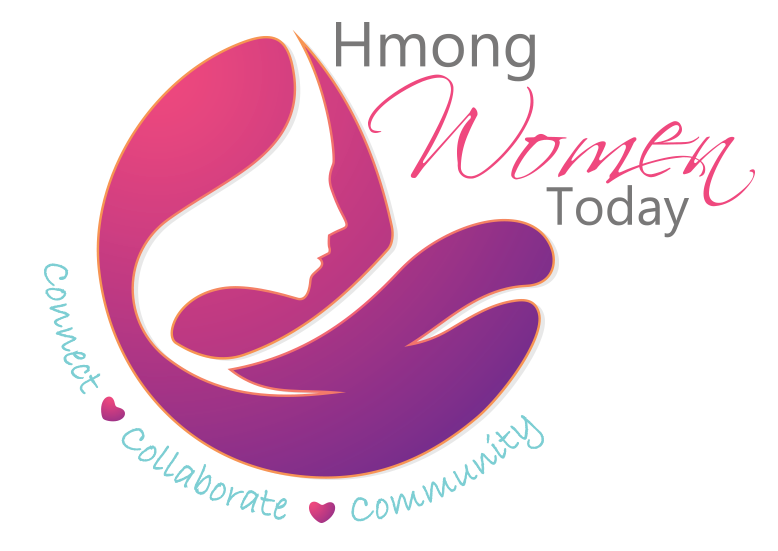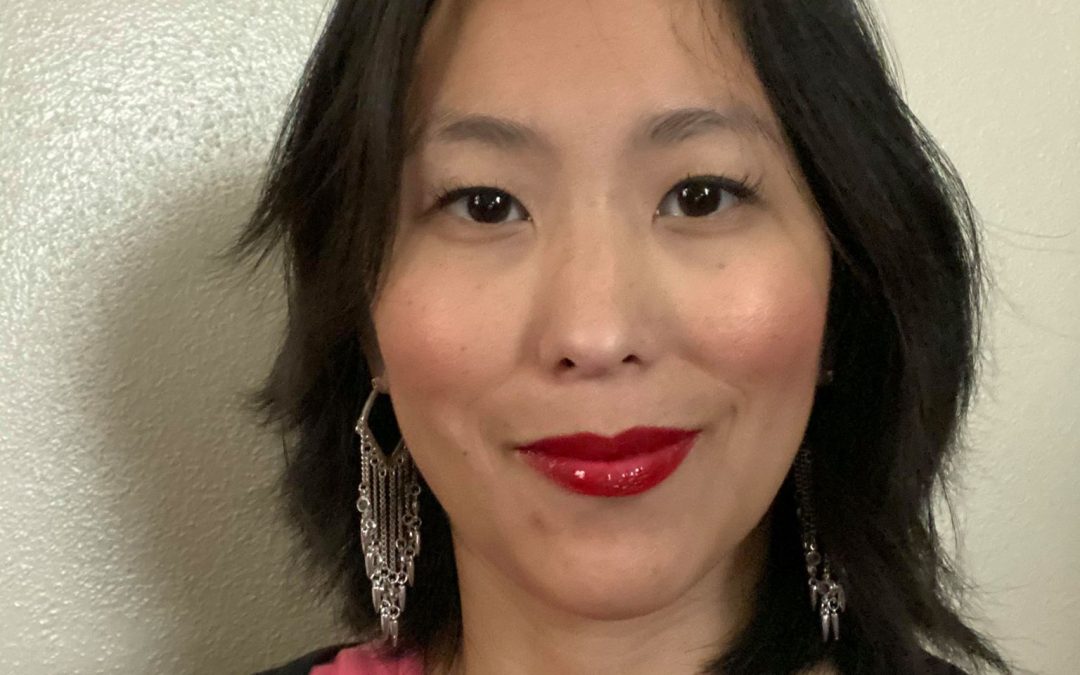“Ua ib tug Nyab, yuav tsum siab ntev, yuav tsum saib yus tus txiv muaj nqi, yuav tsum coj zoo, yuav tsum yug kom tau me tub me nyuam, yuav tsum txawj tab qhuas…,” The list goes on and on. We’ve all heard the many lectures at weddings as we stand there dressed in our traditional clothes wondering when it will turn into words of love. Sadly, it doesn’t. These are the words we take with us into our marriage and what we are expected to do as a Nyab.
“I have in-laws that are described as…1975,” Angela Xiong Moua says as she sits across from me. She’s a petite beautiful Hmong sister wearing a bright purple jacket with gold hoop earrings and painted across her lips is a shade of glittery red lipstick. She takes out a tissue from her purse and excuses herself. “Sorry, since I’ve recovered from cancer, I’m really sensitive to the cold now.”
I’m amazed at how brave and strong she is. She looks up at me and smiles. “I’m sure you’ve heard that term before, right? 1975? I grew up in a modernized family and I had to shift myself into a very traditional family. I became a Nyab to their only son, which made the burden upon me worse, and I was the only educated person during that time. Life was so hard because I was very young, naïve and I had nowhere to turn to vent any of my pain.”
How many of our Hmong sisters have walked this path? Too many and I can tell you that more of them are reading this than I’d like. They marry young and are forced to be molded into the idea of perfection by in-laws that believe how a good Nyab should be. The silent tears we’ve cried as we curled up in bed at night wondering what tomorrow will bring and the smile we force ourselves to carry just to live through another day.
“I didn’t know anything about being a Nyab. I remember one time my mother-in-law asked me to boil a few pumpkins and I literally boiled just three because to me it was a few. And to top it off, what made it worse was that I was going through infertility. When you’re the only Nyab in the family and can’t conceive, the entire world will talk about you in ways that makes you lose yourself. You become so numb and so hurt that you don’t know how to respond back. You just listen and come back home to cry.”
Breaking traditions was the hardest thing for Angela as a Hmong woman as she went through 8 years of infertility before finally conceiving and trying to find herself through her marriage. She became so lost by trying to please others that she didn’t know what her purpose was in life. It wasn’t that her husband didn’t love her; he did. But he grew up with the traditions of what is expected of a Hmong man ingrained into his mind that it was hard for him to let go of traditions to see that he was losing his wife. She was unhappy, sick and contemplating taking her own life.
“I wanted to die because that was my only way out. And then I found out I had cancer,” she says while tearing up. “And honestly, I didn’t even care to get better. Dying of cancer was a release to me because it would rid me of all these traditions that tied me down. It had to get to the point of me not caring to get better, of me wanting to die, that it finally woke my husband up.” Angela’s husband finally had the wake-up call that if he didn’t break the traditions tying him down, he would lose his wife and the mother of his children. She had to sacrifice herself on the line before her husband finally woke up.
“When I was sick with cancer, people were telling me to fight to live for my children. And I thought…why am I fighting to live for my children? Why am I not fighting to live for myself? If I don’t have a purpose to live for, I won’t fight. I remember that the change in me happened one night. It came through to me and I honestly believe it was an angel. It showed me what happiness was like and that I could have it. It lingered in my heart and it stayed in there for a week, making me so happy and so warm. A year later, it happened again and I finally realized that my purpose is that I must be happy. I have to fight to be happy. I have to fight for myself.”
She goes on to say that so many women believe they only have two ways out; death or divorce. “Those are not the only two options available for us women,” she says. “There is a third option and that is to be happy no matter what. You can find happiness if you choose to. I’m sharing my story because I have lived the life of a Nyab being forced to cage herself in and I know that so many women have walked that path.”
How do you break that tradition? How do you get to where you want to be happy? So many women are trapped in a loveless marriage, some abusive, and some being tormented by in laws that do not love them. How do you break the tradition? “Find yourself. Find your purpose. Don’t let it be like me where you had to put your own life on the line before you decide that it’s enough.”
Our Hmong culture has poured rules of what a daughter is to be from the beginning but our tradition cannot control our hearts. “I never really understood the term ‘be deaf like a boar.’ I didn’t understand it because I choose to view it in a different aspect. I would swallow all the pain, all the anger and I would bottle it up until it hurt me. Then I decided to change my vantage point of how I saw things and that was when I realized I am in control of things. Instead of bottling things up, I let go. Be deaf like a boar in the sense that you let go of toxic things and keep only happiness.”
So many of our Hmong sisters live their lives in happiness on the outside world because that’s what they’re taught to do. They are taught to never make their elders lose face, to never put a stain on their parents’ name and to always be patient because tomorrow is always better. But when your life is on the line and you have so much anger and hate poured on you, how do you hold on?
“This is my story and I’m sharing because although I live in the confines of my own home, you and I struggle the same. We must learn to let go of the shame we may put on our elders by wanting happiness. It’s time to let go of traditions that tie us down because it hurts us. I let go of so many things. I let go that maybe I wasn’t meant to be a mother and just focus on my happiness. Then I got pregnant out of the blue. Let go. Let go and be present.”
As we wrap up our conversation, her timer goes off and we get up to take a picture together. Then we hug and I can feel her positive energy flow into me. Happiness is all in you and how much you want it. As I watch her leave, I am left with her beautiful line: “Fight to live for you.”
Angela Xiong Moua can be reached at www.angelaxiongmoua.com axmoua@outlook.com
Huab Lauj
Story Collector
huab@hmongwomentoday
715-338-8286

